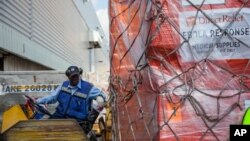An organization providing medical assistance to Ebola-affected countries is expanding its operations to include other health needs. Direct Relief is taking the action as fewer new Ebola cases are reported.
From the early days of the West Africa Ebola outbreak, Direct Relief has been sending emergency medical supplies to the region. So far, it’s sent 40 shipments of medical aid worth $25 million dollars. The organization gets its supplies directly from pharmaceutical companies for use in poor countries.
Andrew MacCalla, Direct Relief’s director of international programs and emergency response, said, “Direct Relief has been one of the largest, if not the largest, and one of the earliest providers of medical assistance into West Africa since the outbreak came about.”
Direct Relief has delivered most of the supplies to Liberia and Sierra Leone, where they were distributed to about 1,000 hospitals and clinics. The organization works with the governments, as well as many NGOs in the affected countries.
“The first planeload was mostly the basic personal protective gear for folks treating Ebola patients. And then as it’s dwindling a bit over there we’re now kind of shifting our focus more towards the essential health care commodities, the essential medications for just restoring the health system that’s been so devastated by Ebola,” he said.
There had been many calls prior to the Ebola outbreak to upgrade healthcare systems in Africa. It most places it did not happen. The epidemic showed just how fragile the health systems were.
MacCalla said, “As we know, this was an area that already had some major struggles in its health delivery system after coming off civil wars and very low doctor-to-patient ratios and extremely high maternal mortality rates. So, when Ebola came about and came to be such a big issue so much of the already lacking health supplies and doctors were diverted towards Ebola. So then what you had was normal, everyday medical things became a much lower priority.”
He said there have been higher rates of malaria and tuberculosis, as well as other health concerns.
“We’re keeping an eye on the Ebola outbreak and know that it needs to get to zero, but really wanting to focus back on things that have been almost forgotten about -- the moms that are pregnant that need to deliver babies safely will a skilled birth attendant. So we’re providing 250 midwife kits for midwives around the country.”
There’s still a shortage of basic medical supplies.
“In this most recent plane that just landed last week, we sent things specifically requested by the ministries of health and the CDC to go into medical clinics in Liberia and Sierra Leone essentially just to be able to reopen them. They’ve had such a drain out of basic supplies like gloves and masks and gowns and bleach and basic medications that we pre-packaged a hundred facility kits – that’s about 50 tons of stuff – to essentially reopen a hundred clinics,” he said.
The goal, MacCalla said, is to support the people who live and work in Liberia and Sierra Leone.
“We’re committed there. The ministries of health have asked us to remain there and we will do so. We’re there for the long run.”
The Direct Relief official said Liberia and Sierra Leone can be rebuilt after the Ebola crisis. He says it will take focus, funding, awareness, medical training and upgraded health facilities.





